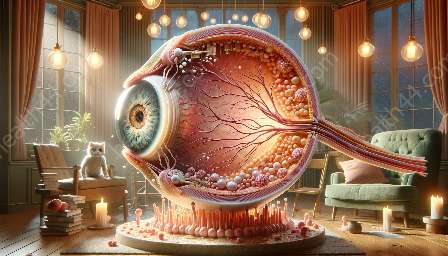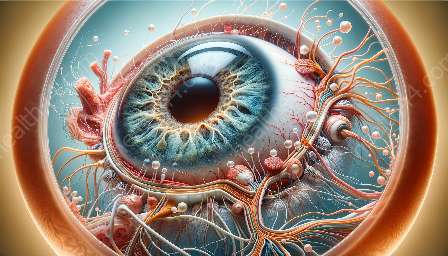The macula, an essential part of the eye's anatomy, plays a crucial role in central vision and overall visual health. Proper nutritional management is vital for supporting macular health and maintaining good eyesight. This topic cluster delves into the significance of nutrition in relation to the macula and offers insights into the essential nutrients and dietary practices that contribute to optimal macular function.
Anatomy of the Eye and the Macula
The eye is a complex organ that enables us to perceive the world around us. It comprises various components, including the cornea, iris, lens, retina, and the macula. The macula is a small, highly specialized area located at the center of the retina, and it is responsible for providing sharp, detailed central vision. This central vision is essential for tasks such as reading, driving, and recognizing faces.
One of the key functions of the macula is to capture and process light, allowing us to see fine details and colors. Given its critical role in visual perception, maintaining the health and function of the macula is paramount for preserving overall visual acuity.
Importance of Nutritional Management for Macular Health
Proper nutrition plays a significant role in supporting macular health and overall eye function. Certain nutrients and dietary practices have been found to be particularly beneficial for the macula, helping to protect against age-related degeneration and other vision-related conditions.
Inflammation, oxidative stress, and free radical damage can contribute to the development of macular degeneration, a leading cause of vision loss. Nutritional management that focuses on anti-inflammatory and antioxidant-rich foods can help reduce the risk of macular degeneration and support the health of the macula.
Essential Nutrients for Macular Health
Several key nutrients have been identified for their role in maintaining macular health and supporting optimal vision. These include:
- Lutein and Zeaxanthin: These carotenoids are present in high concentrations in the macula and act as powerful antioxidants, helping to protect the macula from damage caused by blue light and oxidative stress.
- Omega-3 Fatty Acids: Found in fish and certain plant sources, omega-3 fatty acids have anti-inflammatory properties that can benefit macular health and help reduce the risk of macular degeneration.
- Vitamin C: As a potent antioxidant, vitamin C helps defend the macula against oxidative stress and supports overall eye health.
- Vitamin E: Another important antioxidant, vitamin E helps protect the macula and other eye tissues from damage caused by free radicals.
- Zinc: Zinc plays a crucial role in the metabolism of the retina and the visual pigment in the macula, contributing to its structural stability and function.
Dietary Practices for Maintaining Macular Health
Adopting certain dietary practices can also have a positive impact on macular health. These include:
- Eating a Colorful Variety of Fruits and Vegetables: Fruits and vegetables are rich in vitamins, minerals, and antioxidants that are beneficial for eye health, including the macula.
- Including Fish in the Diet: Consuming fish that are high in omega-3 fatty acids, such as salmon and mackerel, can support macular health and overall vision.
- Moderating the Intake of Processed and Refined Foods: Limiting the consumption of processed and refined foods can help reduce the intake of pro-inflammatory substances and support overall eye health.
- Practicing Portion Control and Maintaining a Healthy Weight: Maintaining a healthy weight through balanced nutrition can contribute to overall eye health, including the health of the macula.
Summary
Nutritional management for macular health is essential for preserving optimal vision and protecting against age-related vision disorders. By understanding the significance of nutrition in relation to the macula and adopting a diet rich in essential nutrients, individuals can support the health and function of this critical visual structure. Incorporating the right balance of nutrients and dietary practices can contribute to maintaining macular health and promoting long-term visual well-being.








